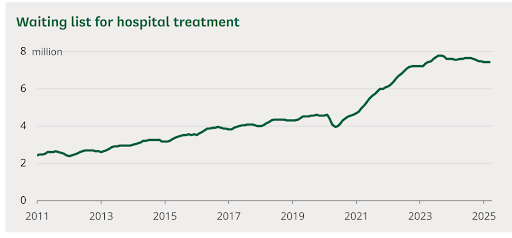Working as a doctor in the UK in 2025 is a rewarding and fulfilling journey. The country offers the opportunity to make a difference in people's lives. It is also one of the highest-paying. On average, a doctor can make 60-70 lakh rupees per year.
What’s even more enticing is the clear path for progression and career growth.
So, if the UK is on your list of dream countries for a medical career, this blog is just for you.
We will go through job opportunities and career growth you can get as a doctor in the UK. This blog explores job opportunities, benefits, and career progression for IMGs in the UK.
Let’s start.
Why moving to the UK as a doctor in 2025 is beneficial
The UK offers not just jobs, but a complete career ecosystem. Here are some key reasons why relocating makes sense this year:
High demand for doctors

Simplified visa routes
The Health and Care Worker visa is specifically designed for healthcare professionals. It offers
- Faster processing
- Lower fees
- Option to bring dependents
Many NHS trusts provide full sponsorship.
Internationally respected training
The UK postgraduate training is globally recognized. You can boost your career value worldwide.
Job security & structured pay
The NHS contracts offer clear progression, annual pay rises, and generous pensions.
Path to settlement
IMGs can apply for permanent residency after five years on the Health and Care visa. The UK can be a long-term option for career and family stability.
Global exposure
Working in the UK means joining diverse teams and treating patients from varied backgrounds. You will work and learn with one of the world’s most advanced healthcare systems.
Pay and Earning Potential
As an IMG, your salary will depend on your grade and whether you’re in training or working as a specialty/locum doctor.
| Position | Base Salary (GBP/year) | In Indian Rupees (INR) |
| Foundation Year 1 (FY1) | £32,000 – £34,000 | ₹34–36 lakhs |
| Foundation Year 2 (FY2) | £37,000 – £38,500 | ₹39–41 lakhs |
| Specialty Training (ST1–2) | £43,000 – £47,000 | ₹45–51 lakhs |
| ST3+ (Senior Registrar) | £50,000 – £60,000 | ₹53–65 lakhs |
| Consultant | £93,000 – £113,000+ | ₹1.01 – 1.23 crore+ |
| General Practitioner (GP) | £70,000 – £110,000+ | ₹76 lakhs – 1.2 crore |
Many doctors choose to start as non-training doctors or locums. This route lets you gain UK experience while preparing for exams and applying for training posts.
Also Read : Doctor Salary in UK 2025- PLAB Route and NHS Pay Bands
Benefits for Doctors in the NHS
Working in the NHS provides more than just a paycheck. Here’s what doctors can expect:
- NHS Pension Scheme: Still one of the best in the UK. It ensures long-term financial security.
- Annual leave & parental leave: Generous leave entitlements
- Study leave & exam support: Employers often fund courses and provide time off for exams, like:
- PLAB
- MRCP
- MRCS
- GP exams
- Relocation support: Many trusts cover visa fees, flights, and initial accommodation. They even provide mentorship programs.

Career Progression
Here’s a simple breakdown of how your career can grow in the UK:
- PLAB or GMC-approved route: Your first step is to register with the General Medical Council of the UK. Most IMGs do this via PLAB, but postgraduate qualifications can also be pathways.
- Non-training role (e.g., Trust Grade, Clinical Fellow): It is a great way to get UK experience while preparing for exams.
- Specialty training entry (ST1–ST3): Once you pass the required exams, you can enter structured training programs.
- CCT / GP registration: Completion of training gives you independent specialist registration.
- Consultant or GP partner: Senior positions with leadership, higher pay, and stability.
Along the way, you can also explore academic medicine, teaching roles, or NHS leadership positions.
The Career Path of a Doctor in the UK
The journey to becoming a fully qualified doctor in the UK is a structured and well-supported process. After completing a medical degree, the typical career path is as follows:
- Foundation Training: This is a two-year program for newly qualified doctors. It provides them with experience in a variety of medical specialties. Upon completion, they receive a Foundation Programme Certificate of Completion.
- Specialty Training: After foundation training, doctors choose to train either as a General Practitioner or in a specific specialty. There are around 60 specialties to choose from, including surgery and cardiology. This training can last from three years for general practice to five to seven years for other specialties.
- Full Registration and Membership Exams: Upon completing their training, doctors gain full registration from the General Medical Council. With this, they can practice independently. They will also need to pass membership exams for their chosen specialty, such as the
- Membership of the Royal College of Physicians
- Membership of the Royal College of General Practitioners
- Continuous Professional Development: Doctors have to learn and grow throughout their careers. This can be done through courses, conferences, and research. It helps them to stay up-to-date with medical advancements. This is also needed to maintain their GMC registration.
Job Opportunities for Doctors in 2025
The NHS recruits doctors across almost all specialties. Some areas of particular demand include:
- General Practice: Family doctors are in short supply across the UK, especially in smaller towns.
- Internal Medicine and Acute Specialties: Roles in emergency medicine and geriatrics have multiple vacancies.
- Psychiatry and Mental Health: There is a growing demand for mental health services.
- Anaesthetics and Surgery: These areas are competitive but have high demand in larger hospitals.
- Consultant Oncologist: These specialists are sought after in areas like clinical and gynaecological oncology.
- Fellowship Positions: There are fellowship opportunities in many areas for doctors to gain specialized experience.
Vacancies exist both in big cities and in rural or semi-rural regions. Rural areas also offer relocation packages and housing support.
Beyond the Hospital Walls: Alternative Careers for Doctors
In the UK, there is a range of career opportunities outside traditional clinical practice. There are several exciting alternative career paths to consider:
- Management Consulting: Top consulting firms hire doctors. Here, they provide clinical expertise on strategic problems within healthcare systems.
- Big Pharma: The pharmaceutical industry needs doctors in areas like medical affairs. Here, they help with the development and marketing of new drugs.
- Healthcare Businesses: Doctors can use their expertise to start their own businesses. They can offer services like diagnostics and training.
Practical tips for IMGs moving in 2025
- Start with PLAB early: Plan your exam dates in advance, as slots fill quickly.
- Check trust benefits: When applying, ask if relocation support, visa sponsorship, or induction training are included.
- Network with IMG groups: Online communities provide practical advice.
- Keep exam goals clear: Prioritize postgraduate exams for faster progression into training.
- Explore long-term residency: If you see the UK as a permanent move, track your Health and Care visa timeline towards settlement.
Why 2025 is a golden window for International Doctors
In 2025, the UK is not just looking for doctors; it needs them. For IMGs, this creates an excellent window of opportunity:
- Clear visa routes.
- Abundant job openings.
- Internationally respected training.
- Long-term settlement options.
A career as a doctor in the UK in 2025 offers a stable and rewarding path. You have a multitude of job opportunities and a competitive salary structure. Doctors in the UK have the chance to build a fulfilling and impactful career in clinical or non-clinical roles.
If you are eyeing the UK, now is the right time to make a move. Academically can also help you with PLAB exam preparation, relocation, and visa application.
And if you just want some guidance, we are just a click away. Talk to our successful alumni and experts to ease your path.






